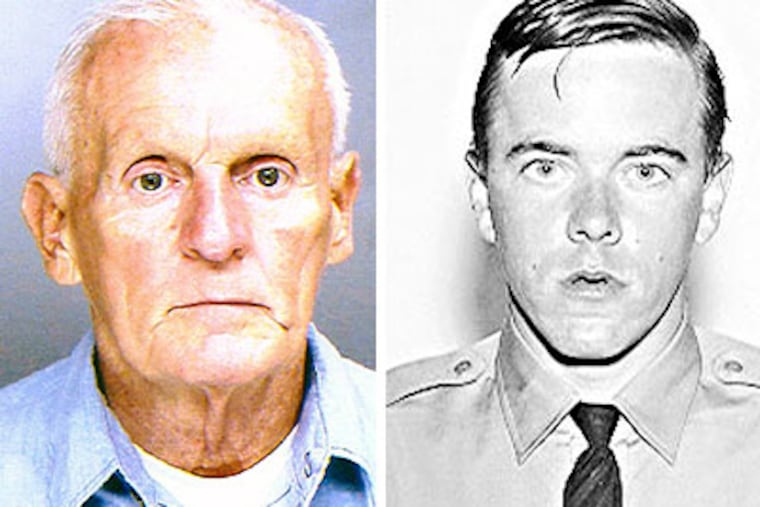Barnes not guilty of murder in 1966 shooting of cop

William J. Barnes, 74, the petty criminal convicted and imprisoned 16 years for shooting and paralyzing Philadelphia police officer Walter T. Barclay in 1966, was acquitted Monday of murder in Barclay's death 41 years later.
The jury's verdict - announced after six hours of deliberations since Friday and without a single question for Philadelphia Common Pleas Court Judge Renee Cardwell Hughes - released decades of bottled-up emotion.
"Yes!" screamed niece Diane Barnes as the first not-guilty, to a charge of first-degree murder, was read by the foreman of the jury of eight women and four men.
She was promptly silenced by courtroom staff who had warned against any reaction. Two more not-guiltys, to counts of second- and third-degree murder, followed.
Then came William Barnes' turn. As the jury was being led from the Criminal Justice Center courtroom, Barnes, weeping, removed his glasses and called out, "Thank you all so much."
But in the front row of the courtroom, Rosalyn Harrison, Barclay's 71-year-old sister, listened to the verdict, her hands covering her mouth and tears welling up in her eyes.
"You bastard!" Harrison said after Barnes thanked the jury. She turned to a female police escort and John McNesby, president of the Philadelphia Fraternal Order of Police, and said, "Get me away from this place."
Harrison and McNesby declined to comment after the verdict.
Although Barnes is now free of all charges in the death of the 23-year-old rookie he shot during a 1966 burglary, he is far from free. When he was paroled in 2006, he had served 16 years of a 20-year sentence for shooting Barclay and was living in a halfway house and working at Philadelphia supermarket.
When Barclay died in August 2007 at age 64, the District Attorney's office ordered Barnes arrested for murder. Authorities found Barnes had a cell phone and car keys - violations of his parole.
"Mr. Barnes won't be released today or any day soon . . . until the parole issue is resolved," said Samuel W. Silver, the defense attorney who led a team from the Schnader Harrison Segal & Lewis LLP law firm that provided "pro bono" representation for Barnes.
Silver estimated it could be six months - or longer - before Barnes' case gets before the state parole board. His next scheduled parole hearing is in 2013, according to Assistant District Attorney Edward Cameron.
Although he could not say what position his office would take on parole, Cameron said Barclay's sister and the FOP were adamantly opposed to it. He added that the cumulative time remaining on Barnes' other convictions - two robberies and a prison escape - could keep him behind bars until 2030.
The trial posed an unusual question for the jury: Can an injury can be directly linked to death even after an intervening life marked by accidents, illnesses and ill-fortune?
The defense never disputed that Barnes shot and paralyzed Barclay. But Silver vigorously challenged how the key prosecution witness - former Philadelphia acting medical examiner Ian Hood - could directly link the 1966 gunshot wound to the urinary tract infection and blood poisoning that eventually killed Barclay.
Three auto accidents and two wheelchair accidents, Silver argued, helped accelerate the deterioration of Barclay's health.
He also cited hospital records that mentioned alleged physical abuse from 2001 to 2003, during which time Barclay had live-in caretakers in his Levittown home.
The records noted that Barclay had complained that the boarders kept him confined in his room, underfed him to the point that he developed scurvy, and left him unwashed and sitting in his own waste.
Barclay contracted incurable bedsores. He went into a nursing home and died four years later.
The jury was also confronted with a difficult courtroom comparison: Barnes, the frail, grandfatherly-looking man with thinning white hair who used a cane, with photos of the 1966 street criminal known as "Cowboy."
Barclay, on the other hand, was present only as the rookie cop in a black-and-white photo, a few family photos and autopsy shots taken when he was exhumed seven months after he died.
"We did our best," Cameron said afterward, "but the time element may have been too much for the jury to overcome."
Cameron also said he believed the jury might have known that Barnes had been convicted and served prison time for shooting Barclay - a fact that has driven the public debate about the fairness of the murder prosecution.
The jurors could have learned that fact from media coverage, although they took an oath not to follow news coverage and to base their decision only on courtroom evidence.
Hood, the prosecution witness, also once misspoke during testimony, mentioning Barnes' "prosecution and conviction" for shooting Barclay.
The jurors were escorted from the courtroom and the building and could not be reached for comment.
District Attorney Seth Williams met privately with Barclay's sister after the verdict and emerged praising the work of prosecutors Cameron and Bridget Kirn.
The prosecution had been initiated by his predecessor, Lynne Abraham, and Williams defended continuing it: "Once the medical examiner ruled it a homicide, we really had no choice but to proceed."
Allen M. Hornblum, an author and former Temple University professor who championed Barnes' parole as a "reformed" criminal, called the verdict "the right call."
The troubling question, he said, is why Barclay lived neglected and alone for so many years while his health deteriorated.
"The money they used on this trial - and I bet it's over $1 million - would have been better spent," he said, "helping officers injured on the job who are now spending time trying to get help from the city."